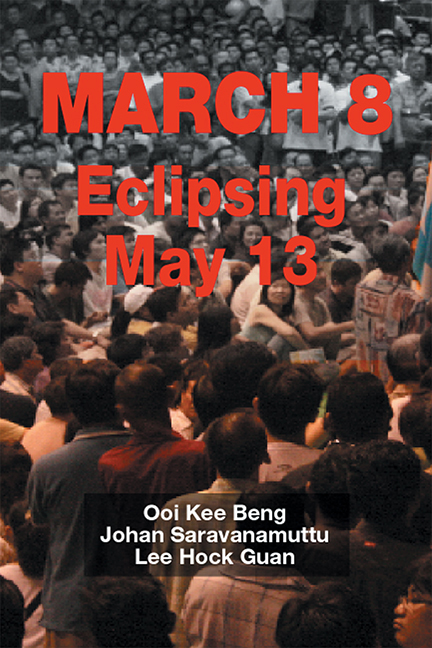Book contents
- Frontmatter
- Contents
- List of Tables and Charts
- Foreword
- Acknowledgements
- About the Authors
- Introduction
- 1 The Opposition's Year of Living Demonstratively
- 2 A Tectonic Shift in Malaysian Politics
- 3 The Ethnic Voting Pattern for Kuala Lumpur and Selangor in 2008
- Postscript: Anwar's Path to Power goes via Permatang Pauh
- Index
- Plate section
1 - The Opposition's Year of Living Demonstratively
Published online by Cambridge University Press: 21 October 2015
- Frontmatter
- Contents
- List of Tables and Charts
- Foreword
- Acknowledgements
- About the Authors
- Introduction
- 1 The Opposition's Year of Living Demonstratively
- 2 A Tectonic Shift in Malaysian Politics
- 3 The Ethnic Voting Pattern for Kuala Lumpur and Selangor in 2008
- Postscript: Anwar's Path to Power goes via Permatang Pauh
- Index
- Plate section
Summary
Introduction
It is quite impossible to deny that Malaysia's 12th General Elections of March 8, 2008 is a watershed in the country's history. The significance of that day is monumental in ways that analysts are still discovering months after the fact.
For a start, it is difficult for the long-time ruling coalition, the Barisan Nasional (BN), not to blame itself for the surprising losses it suffered. Understanding the rise of the opposition coalition — Pakatan Rakyat (PR, People's Pact) — requires at least an analysis of the foregoing period of several months and of how a BN that was in possession of a record-strong mandate could so quickly lose so much ground. Just as interestingly, the BN has not shown any capacity to regain ground in the months that followed.
The actual campaign period itself — thirteen days — showed how unprepared the BN's component parties were for elections that they themselves were empowered to call at any time they found suitable. However, an explanation of the surprising results cannot merely focus on the election campaign itself. The events that went before were too significant to disregard, and the activism of opposition forces too focused to ignore.
A Year of Living Demonstratively
Street rallies in Kuala Lumpur had been on the rise throughout 2007, egged on by a series of by-elections. By the end of that year, these had developed into huge demonstrations. The striking lack of dialogue between protesters and the government, along with the highhanded methods used by the authorities against demonstrators, alienated the activists further from the government and the BN parties.
When 2007 — the 50th anniversary year of Malaysia's independence — began, the opposition had very little going for it. This impression was strengthened as the year progressed by convincing BN victories in a series of by-elections.
Already in an earlier by-election held in November 2005 in Pengkalan Pasir, Kelantan, the BN had managed to win a stunning psychological victory by snatching the seat away from the Parti Islam SeMalaysia (PAS), leaving the state government with only a one-seat majority. BN seemed invincible then. Its winning streak, which had seen Prime Minister Abdullah Badawi getting a record mandate of 91 per cent of parliamentary seats in April 2004, seemed to have no end.
- Type
- Chapter
- Information
- March 8Eclipsing May 13, pp. 6 - 32Publisher: ISEAS–Yusof Ishak InstitutePrint publication year: 2008

